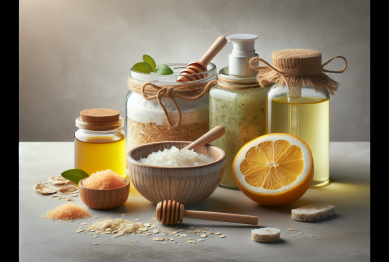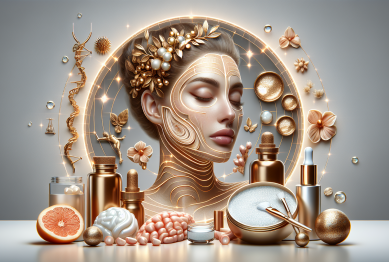Curious about what makes collagen so vital for radiant, youthful-looking skin? This guide unpacks how collagen supports overall skin wellness, explores lifestyle factors that influence collagen levels, and steps you can take to help maintain a healthy glow—all based on trusted, research-backed insights.
The Foundation of Collagen in Skin Wellness
Collagen, a protein found throughout the body, serves as a fundamental building block for skin, hair, nails, and connective tissue. It gives skin its structure, strength, and elasticity, playing a pivotal role in maintaining a smooth, firm appearance. As individuals age, natural collagen production declines, often resulting in visible changes such as fine lines and loss of plumpness. Recognizing the significance of collagen for overall skin health has prompted robust research into its effects and ways to support its presence in the body.
Researchers have connected collagen decline with various intrinsic and extrinsic factors, including hormonal shifts, smoking, sun exposure, and nutritional deficiencies. Recent clinical studies suggest that restoring optimal collagen levels may help reduce the visibility of wrinkles while improving overall skin hydration and resilience (Source: https://www.ncbi.nlm.nih.gov/pmc/articles/PMC3583892/). While topical treatments gain popularity, it is the synthesis and distribution of collagen within deeper skin layers that primarily impact how the skin looks and feels over the years.
The wellness industry’s interest in collagen has sparked innovative treatments, from supplements to cosmetic interventions, each promising skin rejuvenation. However, it remains essential to filter marketing claims through the lens of credible evidence. Maintaining natural collagen through balanced nutrition, sun protection, and healthy lifestyle choices can support a vibrant complexion and delay the signs of aging more effectively than quick-fix solutions.
Lifestyle Choices That Influence Collagen Production
Everyday habits have a substantial impact on the body’s ability to produce and retain collagen. Nutrition plays a central role; incorporating protein-rich foods such as lean meats, eggs, beans, citrus fruits, and leafy greens can supply the necessary amino acids and vitamins (notably C and E) for collagen synthesis. Highly processed foods, excessive sugar intake, and frequent alcohol consumption, on the other hand, may contribute to the breakdown of existing collagen fibers over time.
Frequent exposure to ultraviolet (UV) rays is known to accelerate collagen degradation within the skin. Adopting consistent sun protection routines using broad-spectrum sunscreen, wearing protective clothing, and seeking shade during peak sun hours can minimize UV-induced skin damage. Additionally, environmental pollutants and tobacco smoke present oxidative challenges that further impair the skin’s structure and overall wellness (Source: https://www.cancer.org/healthy/be-safe-in-sun/sun-safety.html).
Quality sleep, regular physical activity, and structured stress management also play a role in collagen preservation. Chronic stress and disrupted sleep patterns may heighten the release of hormones that degrade the skin’s support network. Meanwhile, exercise has demonstrated benefits for circulation and nutrient delivery to skin tissues, further supporting the body’s natural regenerative abilities.
Understanding Collagen Supplements and Topicals
As the popularity of collagen grows, so does the array of products marketed for skin enhancement. Collagen supplements—most commonly sourced from bovine or marine origins—are widely available as powders, capsules, or drinks. While not all claims are backed by robust evidence, several peer-reviewed studies indicate that daily intake of hydrolyzed collagen may contribute to improvements in skin elasticity and hydration (Source: https://www.sciencedirect.com/science/article/pii/S1756464620300268).
The effectiveness of collagen-infused creams and serums is an ongoing topic of discussion among dermatologists. Although topical collagen itself may not deeply penetrate the skin barrier, related ingredients such as peptides, retinol, and vitamin C can boost the body’s own collagen synthesis. It’s important to remember that no single product offers a universal solution; results may vary based on individual skin types, pre-existing conditions, and consistency of use (Source: https://www.aad.org/public/everyday-care/skin-care-basics/dry/collagen-skin-product).
Before integrating a new supplement or topical product into daily routines, consulting with a licensed dermatologist or healthcare provider is always advisable. Understanding the source and quality of ingredients, potential allergies, and the interaction with current regimens can reduce the risk of side effects and optimize the benefits of any wellness intervention.
Dietary Patterns for Supporting Natural Collagen
Whole-food nutrition is key to nurturing skin from within. Protein sources like chicken, fish, and tofu supply essential amino acids, while citrus fruits, bell peppers, and berries provide vitamin C, a cofactor crucial for building and stabilizing collagen fibers in the skin. Zinc and copper—found in foods such as shellfish, nuts, and seeds—also participate actively in collagen formation and repair.
Some traditional dietary approaches, such as consuming bone broth, have gained traction for their collagen content. Although research remains ongoing, regular inclusion of nutrient-dense soups and stews may provide bioavailable peptides thought to support overall tissue health (Source: https://www.hsph.harvard.edu/nutritionsource/collagen/). It’s also beneficial to pair nutrient-rich meals with healthy fats—like those from avocados and olive oil—which can aid in the absorption of fat-soluble vitamins and benefit the skin’s moisture barrier.
Hydration forms the backbone of any skin wellness strategy. Water is fundamental to maintaining skin turgor and facilitating cellular repair, while limiting caffeinated or sugar-laden beverages can help maintain a balanced internal environment that promotes robust collagen networks. It’s often the synergy of many meal choices, rather than a single superfood, that delivers the longest-lasting beauty results.
The Role of Medical and Cosmetic Interventions
Professional treatments aimed at stimulating collagen are becoming more accessible, including microneedling, laser therapies, and radiofrequency procedures. These minimally invasive approaches create targeted micro-injuries that encourage the skin’s own repair processes, supporting new collagen production over multiple sessions (Source: https://www.ncbi.nlm.nih.gov/pmc/articles/PMC7825308/).
While such treatments can provide noticeable improvements, they require careful patient selection, aftercare, and realistic expectations. Results typically develop gradually, as collagen fibers mature, and may be complemented by adjunctive at-home care such as topical antioxidants and barrier-repair creams. The safety and effectiveness of any intervention are deeply influenced by practitioner training and the technology used.
It’s important to note that these therapies are not suitable for everyone. Pre-existing skin conditions, certain medications, or a history of poor wound healing are factors to discuss with healthcare providers before moving forward. Exploring all available options, risks, and benefits is essential, helping individuals make informed decisions about their journey toward enhanced skin wellness.
Long-Term Habits for Maintaining Youthful Skin
Consistency is the thread that runs through sustainable beauty. Rather than sudden shifts or drastic interventions, skin wellness benefits from gradual improvements and conscientious routines. Cleansing with gentle, non-stripping products, layering targeted serums, and finishing with a nourishing moisturizer can support the moisture barrier and set the stage for long-lasting skin health.
Practicing mindful self-care helps reinforce skin-friendly habits. Prioritizing daily SPF application, getting restorative sleep, and finding opportunities for mindful relaxation work synergistically to create an environment in which the skin thrives. Learning to listen to the body’s signals and adapting routines in response to changes such as seasonal shifts or stress can further protect the skin’s resilience (Source: https://www.cdc.gov/aging/publications/features/healthy-aging-skin.html).
Throughout life, embracing a holistic approach to skin wellness that honors nutrition, exercise, emotional wellbeing, and professional care builds a solid foundation for both inner confidence and outward radiance. Science-driven self-care routines place individuals in control, encouraging informed exploration of available options while maintaining realistic expectations and a sense of empowerment.
References
1. Varani, J., Dame, M.K., Rittie, L., et al. (2006). Decreased Collagen Production in Chronologically Aged Skin: Roles of Age-dependent Alterations in Fibroblast Function and Defective Mechanical Stimulation. Retrieved from https://www.ncbi.nlm.nih.gov/pmc/articles/PMC3583892/
2. American Cancer Society. (2022). Sun Safety. Retrieved from https://www.cancer.org/healthy/be-safe-in-sun/sun-safety.html
3. Hexsel, D., Zague, V., Schunck, M., Siega, C., & Camozzato, F. (2017). Oral supplementation with specific bioactive collagen peptides improves nail growth and reduces symptoms of brittle nails. Retrieved from https://www.sciencedirect.com/science/article/pii/S1756464620300268
4. American Academy of Dermatology Association. (2022). Collagen: ‘Fountain of youth’ or product to avoid? Retrieved from https://www.aad.org/public/everyday-care/skin-care-basics/dry/collagen-skin-product
5. Harvard T.H. Chan School of Public Health. (2022). Collagen. Retrieved from https://www.hsph.harvard.edu/nutritionsource/collagen/
6. Hassan, I., & Kaur, S. (2021). Microneedling: Advances and widening horizon. Retrieved from https://www.ncbi.nlm.nih.gov/pmc/articles/PMC7825308/









